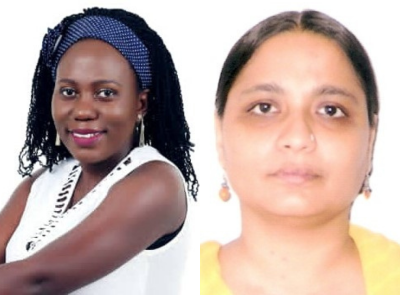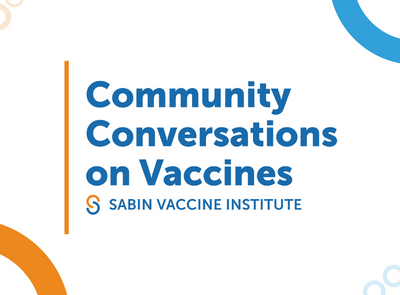Reaching Zero-Dose Children and Underserved Communities: Lessons from Pakistan and Ghana with Dr. Aamer Ikram and Rukaya Mumuni
Dr. Aamer Ikram and Rukaya Mumuni discuss efforts to improve routine immunization and vaccinate zero-dose children.
In this episode of Community Conversations on Vaccines, co-hosts Vince Blaser and Francesca Montalto of the Sabin Vaccine Institute are joined by Dr. Aamer Ikram, chief executive officer of the National Institutes of Health Pakistan, and Rukaya Mumuni, a public health officer and registered nurse in Ghana. They discuss the decline in immunization during the pandemic, vaccination coverage during natural disasters and national emergencies, and efforts to improve routine immunization and vaccinate zero-dose children. They also highlight successful strategies for reaching underserved communities, such as Ghana’s innovative drone delivery system.
Rukaya is a dedicated health worker and advocate, serving as a public health officer and registered nurse, with a deep commitment to promoting the well-being of individuals and communities. Her primary focus lies in ensuring a healthy population through comprehensive vaccination programs, health education initiatives, and nutrition rehabilitation efforts. For the past 12 years, Rukaya has been an integral part of the Ga West Municipal Hospital in Accra, Ghana. Rukaya’s educational background includes a Diploma in Registered Nursing from the Tamale Nurses’ and Midwives’ Training College, as well as a B.S. in Registered Nursing from University of Ghana. Rukaya is a Sabin-Nursing Now Challenge Immunization Advocacy Champion.
Aamer has worked at the National Institutes of Health (NIH) Pakistan for six years and previously held executive positions at the Pakistan Health Research Council and The Global Fund. Aamer’s extensive education includes a Ph.D. in Microbiology from Baqai Medical University, as well as diplomas and certificates in Clinical Pathology, Emerging Infectious Diseases, and Dual Use Biosecurity. His expertise and contributions have positively influenced the healthcare and research sectors in Pakistan and beyond.
Learn more from Aamer and Rukaya by checking out the key takeaways of this episode below or the transcript.
Key Highlights:
- 06:10 – 10:45 – VARN2023 – Dr. Aamer Ikram recently attended the 2023 Vaccination Acceptance Research Network (VARN) Conference in Bangkok, where discussions focused on vaccine acceptance challenges and reaching zero-dose children. Aamer highlighted the importance of networking and sharing experiences among community-based researchers from low- and middle-income countries. The conference emphasized the need for effective strategies and policies to address vaccine acceptance and reach vulnerable populations. Aamer expressed optimism for significant progress in the next five to ten years, particularly in locating zero-dose children and addressing the needs of missing communities.
- 10:45 – 16:15 – Vaccination During Crisis – During the first COVID-19 lockdown in Pakistan, as in most countries, a policy of micro-lockdowns was adopted to balance the economy and combat the virus. This approach, driven by data and technology, helped maintain routine immunization. Later, during massive flooding, the country faced cholera outbreaks, which were successfully controlled with the oral cholera vaccine. Pakistan also tackled a widespread outbreak of antibiotic-resistant Salmonella Typhi, utilizing the typhoid fever vaccine introduced in 2019. A bottom-up approach was employed, identifying areas in need and involving community influencers, religious leaders, and CSOs. The model emphasized community engagement, coordination, and accountability to deliver services effectively. The lessons learned from COVID-19 vaccination contributed to training human resources and improving infrastructure, benefiting not only zero-dose and defaulted children but also previously underserved communities.
- 16:15 – 22:34 – Community- and Resource-Building and Gender Equity – In Ghana, various strategies have been implemented to enhance effective communication between public health authorities, health workers, and the general public in order to address vaccine misinformation. One of these strategies involves clear and consistent messaging, where public health authorities in Ghana have emphasized the importance of providing accurate and consistent information about vaccine safety, efficacy, and benefits to communities. This approach helps health workers become knowledgeable about vaccines, enabling them to address concerns or misconceptions among the public.
Another strategy involves training and capacity-building programs for health workers, aimed at enhancing their understanding of vaccines and equipping them with the necessary skills to communicate effectively. These training sessions provide accurate and up-to-date information about vaccines, helping to dispel common misconceptions and increase health workers’ confidence in addressing vaccine-related concerns. It is important to expand these training programs to include all health workers, not just those directly involved in vaccination, as all health workers are part of the community and often serve as the first point of contact for information on vaccination and other health issues.
Engaging local community leaders and stakeholders is another effective strategy. Recognizing their influence, public health authorities collaborate with community leaders and religious bodies to disseminate accurate information about vaccines to their members and communities. This collaboration helps in debunking myths and common misconceptions surrounding vaccines.
Using various communication channels is crucial in reaching different segments of the population. Traditional media, such as television, has been a common communication channel. But the rise of social media has provided additional avenues to disseminate information about vaccines and address misconceptions in communities.
To further improve vaccination coverage and protect vulnerable populations, Rukaya recommends that governments and policymakers work to elevate women’s voices, as women make up a significant portion of the healthcare workforce.
- 22:35 – 26:42 – Communication Tools and Human Resource Training – Effective communication is crucial for boosting vaccination rates and supporting governments in addressing vaccine acceptance. Social media can play a positive role, but it’s important to counter misinformation and build trust. Training master trainers and utilizing online platforms can facilitate knowledge sharing. Equitable access to vaccines is vital, and countries must develop effective communication strategies. Prioritizing accurate information, addressing hesitancy drivers, and engaging vulnerable populations are key to ensuring successful vaccination efforts.
Connect with our Guests
Learn more about Dr. Aamer Ikram’s work:
- Follow NIH Pakistan on Twitter @NIH_Pakistan
- Devex @ UNGA77 in partnership with Sabin Vaccine Institute: Reversing alarming declines in immunization
Connect with Rukaya Mumuni on Twitter @RukayaMumuni. Learn more about Rukaya’s work:
Devex @ UNGA77 in partnership with Sabin Vaccine Institute: Reversing alarming declines in immunization
Meet Our Guests











